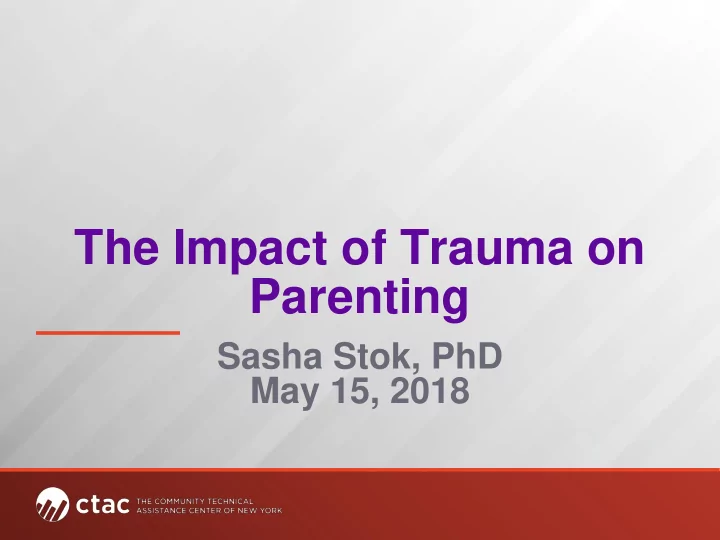

The Impact of Trauma on Parenting Sasha Stok, PhD May 15, 2018
SMSC Intro • Michael Lindsey (PI) and Claude Chemtob (Co- PI) • Funded by Annie Casey Foundation and Robin Hood • Targeted intervention for mothers with PTSD and children between 3-6 who have child welfare involvement • Parenting STAIR (P- STAIR) → Skills Training in Affective Interpersonal Regulation + Parent Child Interaction Therapy
Outline • Review of childhood trauma and outcomes • How childhood trauma impacts adults • How PTSD symptoms impact parenting • Helping parents with trauma histories • Purpose of psychoeducation • Strength-based approach
Adverse Childhood Experiences Physical /Sexual Abuse Poverty DV Neglect Community Unstable Institutional Violence Housing Racism Inter- generationa l Trauma Greater chance of death, disease, impaired social and emotional functioning, alcohol and drug abuse, trauma and depression, and increased medical care costs
How Childhood Trauma Impacts Adults • Early home life helps child to develop model of world. • When early home life involves trauma → World is safe internal model is vs. distorted. World is not safe
How Childhood Trauma Impacts Relationships • Attachment styles developed within context of trauma can have lasting impact on relationships. • Examples: • Preoccupied mothers (with unresolved trauma) present as more hyperactive and in “fight” mode. • Dismissive mothers present as more defensive and tend to detach from interactions that trigger negative emotions.
How Childhood Trauma Impacts Parenting A history of childhood trauma can impair a parent’s ability to accurately read and respond to their child’s emotions. “I don’t really know why he’s sad. But I don’t really deal with it…Like, I’ll do the hugging and the “it’s ok” and all that other kind of stuff but I don’t…I try not to feel anything for anything…unless I have to. That’s usually how I deal with it.”
How PTSD Symptoms Impact Parenting AVOIDANCE/NUMBING HYPERAROUSAL RE-EXPERIENCING/ TRIGGERS -Avoidance of negative -Sensing danger and emotions or memory is threats. -Parenting in itself can an adaptive defense be trigger or reminder -Can lead to higher mechanism but can of past trauma. stress, anxiety and impair relationship. irritability. -Triggers can be scary -May present as for parent and for dissociation, substance child, who may not use or physical or understand. emotional separation form child,
Parenting Beliefs Parenting Parenting Beliefs Styles • “The world is a tough place. Children need to learn early to protect themselves.” • “I had a rough childhood – in and out of foster care and now my kid is going through that. Now that he is home, I am going to try my best to make up for the hurt.” • “Kids just like to manipulate me, just trying to push my buttons. They cry and fuss over every little thing, so I just pay them no mind.”
Safety • Difficulties assessing risk in potential partners and difficulties cutting ties with abusive family members. • Mother may present as overprotective in some situations but lacking awareness of dangerous situations in others.
Helping Parents with History of Trauma • Assess parent’s history for trauma or other mental health needs • Disclosure may occur slowly • Ask open-ended questions • Psychoeducation – fancy word for teaching! • Help parents understand their anger, fear, resentment, or avoidance as NORMAL reactions to past trauma. • Understand that traumatized parents are not bad. do not judge or blame them. ALL parents make mistakes! • Present behavior is a means to cope with past.
Helping Parents with History of Trauma • Build safe and collaborative relationship • Parent is expert! • Accept without judgment • Be consistent with what you say and do! • Strengthen and encourage a parent’s self - compassion
Strength-Based Approach
Strength-Based Approach
Q & A
Social Workers and LMHCs : How to Obtain Your Continuing Education for this Webinar ‣ Create a Username & Password at the NYU Silver CE Online Portal : • https://sswforms.es.its.nyu.edu/ ‣ Log on to the “Continuing Education Online Portal for the NYU Silver School of Social Work” page, click on “All Events & Programs” tab ‣ Scroll down & select today’s webinar under “Online Learning” ‣ Click “Register” ‣ Fill in the billing information, click register, and pay the CE registration fee Remember: Our system works best with Google Chrome or Mozilla Firefox
Social Workers and LMHCs : How to Obtain Your Continuing Education for this Webinar ‣ After registering, you will receive a confirmation email with a link to complete an evaluation ‣ Once the evaluation is submitted, within 24 - 48 hours, log back on to NYU Silver CE Online Portal, go to “Your Registrations” and you will see “Take Assessment” in red next to the name of the program ‣ Complete assessment ‣ Once done, you will be directed how to download your CE certificate ‣ For Questions: Call us at 212-998-5973 or email us at silver.continuingeducation@nyu.edu
Recommend
More recommend